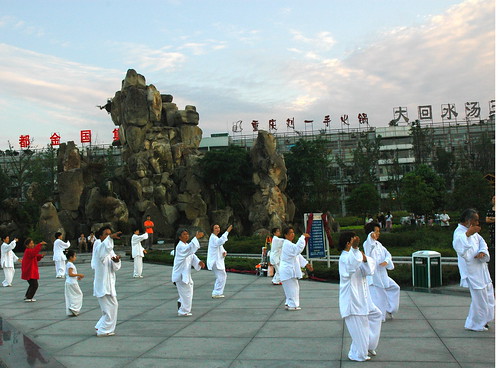
Welcome to the second Interfaith Blog Event! In each installment of this series, which we're hoping to do on a monthly basis, we'll explore a single topic across three different religious traditions. I am, obviously, writing from the Mahayana Buddhist tradition. Jon, from
Jesusfollowers Journal, will be writing from a Protestant Christian perspective, and Sojourner from
A Pagan Sojourn, will be writing from a Pagan perspective.
The topic we'll be discussing today is the following:
Is there anything you consider to be intrinsically right or wrong? What grounds do you have for that conclusion? How does the concept of morality impact your everyday life?
[Jon's Essay] [Sojourner's Essay]Back in the 5th century BCE, Siddhartha Gautama was born in a country immersed in Hindu spirituality. B.K.S. Iyengar states,
"In Indian thought, everything is permeated by the Supreme Universal Spirit (Paramatma or God) of which the individual human spirit (jivatma) is a part." [1] Later, he continues,
"By profound meditation, the knower, the knowledge, and the known become one. The seer, the sight and the seen have no separate existence from each other. It is like a great musician becoming one with his instrument and the music that comes from it. Then, the yogi stands in his own nature and realizes his self (Atman), the part of the Supreme Soul within himself." [2]
As a prince, Siddhartha's education included detailed study of the Vedas, the sacred scriptures of Hinduism as revealed by the Supreme Being. But after having renounced his royal lineage to pursue the life of a monk, and training with the greatest spiritual teachers of his day, Siddhartha found that such training was highly beneficial, but it did not lead to the highest attainment--ultimate peace, Enlightenment. Specifically, Siddhartha could find nothing within that corresponded to the Atman. Rather, on the night of his Awakening, he personally experienced the emptiness of all things, that everything, and everyone, existed based upon the cumulative effect of other existing causal factors and the proper conditions within which such causal factors may operate. Hence, the animating principle of the Atman was illusory--we existed not because a piece of the great Brahma, the Creator, was injected into us by said Supreme Being, giving us a fully independent existence, but solely based on the existence of other causes.
After his enlightenment, the Buddha met up with some old friends with whom he had practiced for years. As his first teaching as the Awakened One, he taught that, as we observe the world, one thing is obvious: Suffering exists. This teaching had two components. First, it implied that because we were born, we would experience disease, old age, and death, as well as personal hardship. These "unavoidables" often lead us to experience the second component of this Truth--mental suffering. This second component of the First Noble Truth explains that these unavoidables are not suffering; suffering is our mental response to such experiences. We cause ourselves to suffer because of our response to our life experiences.
In his practice, as the Buddha removed the causes of suffering--the mental poisons of greed, hatred, and ignorance--he noticed that genuine, perfect happiness arose naturally, replacing the suffering that had existed previously. As a young prince, he had experienced the pinnacle of worldly pleasures. But this new, genuine happiness completely transcended such worldly happiness. It is
"The joy which is beyond the pale of the senses which reason cannot grasp." It is
"The treasure above all others. There is nothing higher than this." [3] Furthermore, the Buddha observed that all beings desire happiness and avoid suffering. Therefore, combining these two insights, it was clear to the Buddha that the attainment of genuine happiness for all beings, and the removal of their suffering, was the ultimate spiritual aim.
Before examining how this aim determines Buddhist ethics, let's examine happiness. The Buddha observed that happiness comes in two forms, relative and genuine. As he experienced as a Prince, worldly happiness is relative--what makes one person happy may cause suffering to another. Consider a person out on a hot day. If the person enjoys hot weather, he will be happy. But if he does not like hot weather, then such temperatures will cause him to suffer. Continuing this example, if the person does not like hot weather and hence enters a cool bath, this will please him. But relative (worldly) happiness is also transient--if he stays in the cool water too long, he will become cold, and hence will begin to suffer.
Contrary to relative happiness, genuine happiness does not fluctuate wildly. Genuine happiness is absolute--genuine happiness to one person is genuine happiness to all people. The principle characteristic of genuine happiness is inner peace [4].
"[If] we can develop this quality of inner peace, no matter what difficulties we meet with in life, our basic sense of well-being will not be undermined." [5] No external factor can create such peace. But how can it be developed? Like everything else in life, it is dependent on causes and conditions. Hence, we must identify its causes and conditions and then cultivate said causes to bring about genuine happiness.
In the 2,500 years since the Buddha first explained these teachings, it has been experienced over and over by Buddhists that altruism is an essential ingredient of genuine happiness. For thousands of years, Buddhists have written of their experiences with altruism--that not only do altruistic actions cause others happiness and reduce their suffering, they also make the altruistic person's life meaningful and happy, and reduces that person's suffering. In summary, therefore, we have discussed the following:
- We have observed that all beings desire happiness and avoid suffering.
- The Buddha experienced genuine happiness and gave us the path to attain such happiness ourselves.
- Altruism is an essential ingredient of genuine happiness.
By merging these three observed truths, we can develop a statement of Buddhist ethics:
"An ethical act is one which does not harm others' experience or expectation of happiness." [6]
This definition raises an obvious concern: how does one determine whether an act will harm another's experience or expectation of happiness? Before we consider this question, however, let's apply this definition to isolated examples of the Five Precepts, the traditional guidelines of Buddhist ethics, to gain a better understanding of how to make practical use of this definition. The first precept is "Do not kill." Obviously, killing another being harms that being's experience of happiness and its desire to avoid suffering. Furthermore, it harms the killer's experience of happiness because, regardless of the worldly feelings of exhilaration that the killer may experience, penetrating insight always discovers the ultimate suffering to one's self that killing causes
1. The second precept is "Do not lie." If a person needs to know the truth about something, a lie prevents them from knowing that truth and, hence, they suffer (albeit potentially unknowingly). Lies also harm the liar because he can begin to become entangled in his web of lies, and hence he suffers. The third precept is "Do not steal." Stealing inflicts suffering on another due to their loss. It increases suffering for the thief as well because it enhances the growth of the seed of greed in the thief's mind. The fourth precept is "Do not engage in sexual misconduct." The emotional damage of adultery and other such liaisons is well documented. The fifth precept is "Do not take intoxicants, or engage in their production, nor in the productions of weapons and poisons." One might not be able to stop the production of weapons in the world, but one need not exert one's own effort in their production, whose use ultimately harms many beings. Taking intoxicants is more of a preventative measure in that such use can increase the likelihood of acting unethically.
Therefore, it seems clear that the definition provided by the Dalai Lama provides an effective measure of ethical action in these "ideal" instances. However, life is much more complex than these idealized circumstances. Hence, one must ask how one can determine whether an act will harm another's happiness. Buddhism answers this question through the development of skillful means. The Dalai Lama writes,
We find that in practice, if we are not able to connect with others to some extent, if we cannot at least imagine the potential impact of our actions on others, then we have no means to discriminate between right and wrong, between what is appropriate and what is not, between harming and non-harming. It follows, therefore, that the more we could enhance our sensitivity toward others' suffering, the less we could tolerate seeing others' pain and the more we would be concerned to ensure that no action of ours caused harm to others. [7]
Therefore, it is through the development of compassion that genuine ethical conduct arises. Compassion provides the motivation for ethical conduct, as one cannot bear to harm another. But to what degree can compassion be developed? Buddhism has taught for millenia, and countless examples are described, of people developing compassion to the utmost degree, where their every act is based on their love for others. The Buddha and Jesus are probably the two greatest examples in recorded history.
If compassion provides the motivation, from where, specifically, does the ability to discern harming from non-harming actions come? Every aspect of Buddhist training leads one toward the development of correct discernment. Buddhist meditation develops concentration, which is necessary to be able to penetrate through the illusory surface of experience to know its true nature. Without highly developed concentration skills, our mind gets distracted and, hence, never reaches the true nature of phenomena. Through concentration and mindfulness, wisdom arises. This critical faculty is the key component to determining ethical from unethical actions. Buddhism also focuses on the removal of afflictive emotions such as anger, greed, and laziness, because such emotions obscure one's critical faculties, thereby reducing one's ability to discern harming from non-harming acts. (Recall how clearly you were thinking the last time you were really angry. How many times have you hurt someone through your words when seized by anger?)
Therefore, we must constantly check all of our actions and employ our critical faculties, ensuring that our actions are motivated by compassion. As stated so eloquently by the Dalai Lama,
[Have we] asked ourselves whether we are being broad-minded or narrow minded? Have we taken into account the overall situation or are we considering only specifics? Is our view short-term or long-term? Are we being short-sighted or clear-eyed? Is our motive genuinely compassionate when considered in relation to the totality of all beings? Or is our compassion limited just to our families, our friends, and those we identify with closely? [8]
He continues by admitting that, given the complex nature of our world, all possible alternatives may appear to harm somebody.
"Under such circumstances, we must use our intelligence to judge which course of action will be least harmful in the long run" to the greatest number of beings. [9]
He summarizes this train of thought as follows:
The moral value of a given act is to be judged in relation both to time, place, and circumstance and to the interests of the totality of all others in the future as well as now. But while it is conceivable that a given act is ethically sound under one particular set of circumstances, the same act at another time and place and under a different set of circumstances may not be. [10]
Therefore, returning to the question posed at the beginning of this essay, there is nothing I can consider to be intrinsically right or wrong. Because of the infinite variety of situations, causes, and conditions, it seems intractable to consider any act as having inherent value that is not determined, to some degree, by surrounding circumstances. Furthermore, as the ethical system as described herein is not based on decree from a godhead, there is no ground from which to state that any action is intrinsically right or wrong.
Transitioning to the final aspect of the question that began this essay, I refer to the following statement by the Dalai Lama:
It may be worth reviewing the grounds for defining ethical conduct in terms of non-harming. As we have seen, given the complex nature of reality, it is very difficult to say that a particular act or type of act is right or wrong in itself. Ethical conduct is thus not something we engage in because it is somehow right in itself. We do so because we recognize that just as I desire to be happy and to avoid suffering, so do all others. For this reason, a meaningful ethical system divorced from the question of our experience of suffering and happiness is hard to envisage. [11]
In this passage, the Dalai Lama appears to agree with my conclusion regarding the relative nature of ethical conduct. He also makes clear the impact morality has on our everyday lives. Each and every day we attempt to act in a way that increases our happiness and decreases our suffering. Little do we realize, however, that the worldly happiness we chase paradoxically INCREASES our suffering due to its transient nature and long-term effects. Therefore, the better we learn to discern harming from non-harming actions, the happier those around us become, and the happier we become. Buddhism teaches that such training in discernment and compassion comprises the basis for all our true happiness in the world. As such, they comprise practices that we endeavor to employ in every moment of our lives. For Buddhists, therefore, there is never a single moment in time in which morality does not impact our daily lives.
Footnotes:1This is a topic for another essay.
References:[1] Light on Yoga. B.K.S. Iyengar. 1979. Pg. 19.
[2] Ibid. Pg. 22.
[3] Ibid. Pg 19.
[4] Ethics for the New Millenium, His Holiness the Dalai Lama. 1999. Pg. 55.
[5] Ibid. Pg. 56.
[6] Ibid. Pg. 49.
[7] Ibid. Pgs. 72-73.
[8] Ibid. Pgs. 149-150.
[9] Ibid. Pg. 152.
[10] Ibid. Pg. 153.
[11] Ibid. Pg. 147.


















